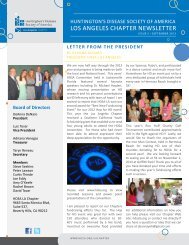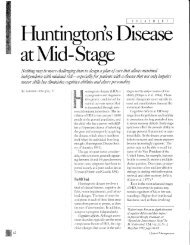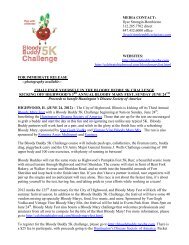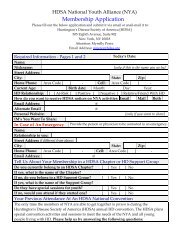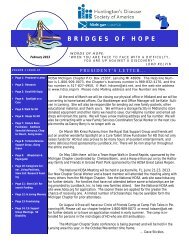Understanding Behavior in HD.final.8-18-05 - Huntington's Disease ...
Understanding Behavior in HD.final.8-18-05 - Huntington's Disease ...
Understanding Behavior in HD.final.8-18-05 - Huntington's Disease ...
You also want an ePaper? Increase the reach of your titles
YUMPU automatically turns print PDFs into web optimized ePapers that Google loves.
27<br />
A common, and normal, response to hav<strong>in</strong>g <strong>HD</strong> is sadness, but this sadness can sometimes be a warn<strong>in</strong>g<br />
sign of a more serious problem called depression. Often, when <strong>in</strong>dividuals become depressed, they also have<br />
reduced concern and energy for other aspects of life.<br />
COPING STRATEGIES FOR APATHY<br />
• Do not <strong>in</strong>terpret a lack of <strong>in</strong>itiation or activity as “laz<strong>in</strong>ess.” Educate family members and friends about<br />
the <strong>in</strong>ability to “beg<strong>in</strong>” or “<strong>in</strong>itiate” behaviors and ask others to encourage participation <strong>in</strong> activities.<br />
Gently guide behaviors but respect “no.”<br />
• Use calendars and rout<strong>in</strong>es as suggested earlier (see pages 7, 19, 20).<br />
ORGANIZATION<br />
DEFINITION<br />
Difficulties <strong>in</strong> plann<strong>in</strong>g, thought organization, sequenc<strong>in</strong>g, and prioritiz<strong>in</strong>g can affect attempts to follow a<br />
recipe, to complete a list of household errands, to apply for social security benefits or to put on a d<strong>in</strong>ner party.<br />
These same organizational impairments affect problem solv<strong>in</strong>g and logical th<strong>in</strong>k<strong>in</strong>g (deductive reason<strong>in</strong>g).<br />
When the bra<strong>in</strong> cannot sequence bits of <strong>in</strong>formation, many aspects of <strong>in</strong>tellectual, social and personality<br />
functions are impaired.<br />
EXAMPLES<br />
Errands that used to be completed <strong>in</strong> two hours now take all day and even then may not be completely<br />
done. Problems might <strong>in</strong>clude the follow<strong>in</strong>g: the errands were not written down and some were accidently<br />
skipped; they were not organized <strong>in</strong> a logical and efficient way, e.g., from closest to farthest from home;<br />
necessary papers were overlooked and left beh<strong>in</strong>d, so a trip back home was needed.<br />
COPING STRATEGIES FOR DISORGANIZATION:<br />
SUGGESTIONS FOR IMPAIRED PLANNING<br />
• Make lists that help to organize the <strong>in</strong>dividual tasks <strong>in</strong> the order needed to do an activity.<br />
• Prompt each step of an activity.<br />
• Rely on rout<strong>in</strong>es that can be much easier for the <strong>HD</strong>-affected<br />
person to <strong>in</strong>itiate or cont<strong>in</strong>ue without guidance.<br />
SUGGESTIONS FOR IMPAIRED DECISION-MAKING<br />
• Offer some choices but not too many at once.<br />
• Avoid power struggles.<br />
• Avoid open-ended questions.<br />
• Use short, simple sentences.



